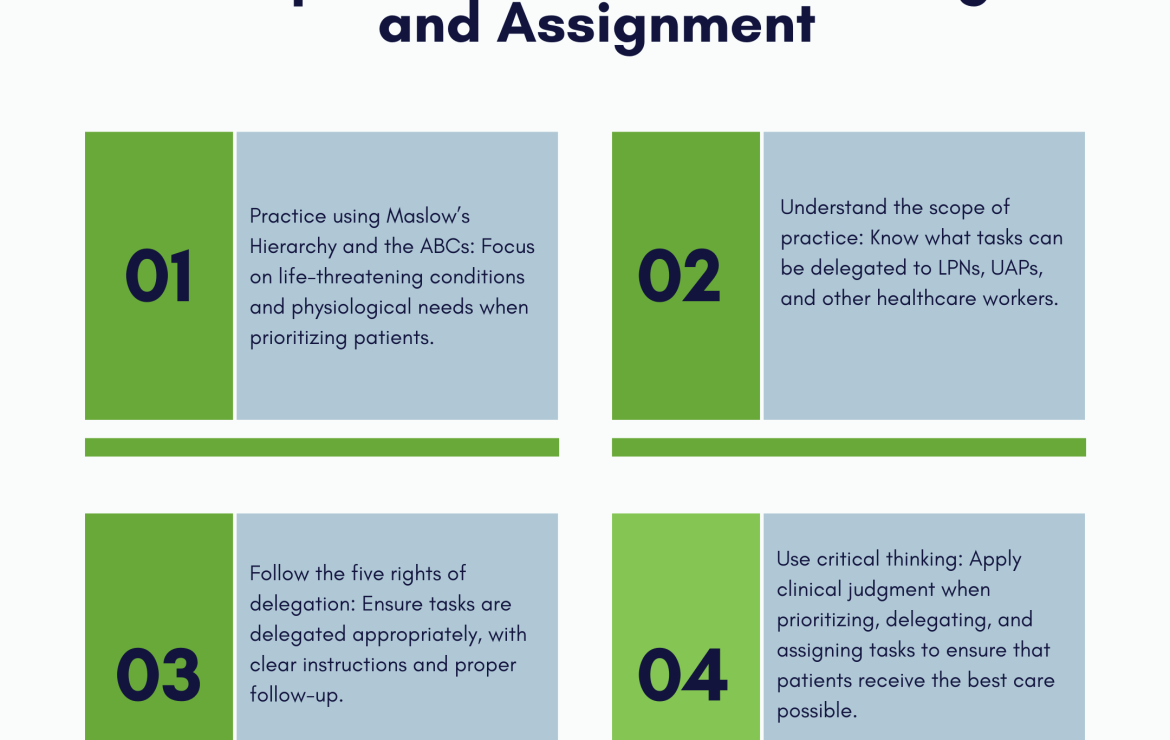Fundamentals of Nursing: Prioritization, Delegation, and Assignment

Prioritization, delegation, and assignment are fundamental skills in nursing practice, especially for new graduate nurses preparing for the NCLEX exam. These concepts are essential for delivering safe, effective, and patient-centered care while managing a dynamic workload. This blog post will cover the key principles of prioritization, delegation, and assignment, as well as provide NCLEX-style questions to help guide your preparation.
1. Prioritization in Nursing
Prioritization involves deciding which patient needs require immediate attention and which can wait. Nurses must be able to evaluate patient conditions and make decisions based on the urgency and severity of each situation. The ability to prioritize care ensures that patients with the most critical needs are addressed first.
Key Principles of Prioritization
- Maslow’s Hierarchy of Needs: Focus on physiological needs (e.g., airway, breathing, circulation) before addressing other needs like safety, love, and self-esteem.
- ABCs (Airway, Breathing, Circulation): Always address issues related to airway, breathing, and circulation first. For example, a patient in respiratory distress takes priority over a patient with a fever.
- Acute vs. Chronic: Prioritize acute conditions or sudden changes in a patient’s status over chronic, stable conditions. For instance, a patient experiencing sudden chest pain will take precedence over a patient with a long-term diagnosis of diabetes.
- Life-threatening vs. Non-life-threatening: Address life-threatening conditions before non-life-threatening ones. For example, a patient with signs of shock (e.g., low blood pressure, cold skin) would be a higher priority than a patient reporting mild discomfort.
Sample NCLEX Question
Question:
A nurse is caring for four patients. Which patient should the nurse see first?
A. A patient with chronic obstructive pulmonary disease (COPD) who is requesting oxygen
B. A postoperative patient with a blood pressure of 90/60 mm Hg and cool, clammy skin
C. A patient with diabetes who is asking for insulin before lunch
D. A patient with a headache rating the pain as 8/10
Answer:
B. The postoperative patient with a blood pressure of 90/60 mm Hg and cool, clammy skin should be seen first, as they may be in shock or experiencing a life-threatening condition.
2. Delegation in Nursing
Delegation is the process of transferring responsibility for the performance of a task from one healthcare provider to another while retaining accountability for the outcome. Nurses often delegate tasks to unlicensed assistive personnel (UAP), licensed practical nurses (LPNs), or other healthcare team members to improve efficiency and ensure that all aspects of patient care are covered.
Five Rights of Delegation
- Right Task: Delegate tasks that are within the scope of practice for the person you are delegating to (e.g., vital signs can be delegated to a UAP, but medication administration cannot).
- Right Circumstance: Ensure that the task is appropriate for the patient’s condition and that the patient is stable. Complex or unstable patients should be managed by the nurse directly.
- Right Person: Delegate tasks to individuals who are qualified and competent to perform them.
- Right Direction/Communication: Provide clear, concise instructions when delegating a task. The person receiving the delegation should understand exactly what needs to be done, how to do it, and when it needs to be completed.
- Right Supervision/Evaluation: Follow up with the person to whom you delegated the task to ensure it was completed correctly and evaluate the outcomes.
Sample NCLEX Question
Question:
A nurse is delegating tasks to the UAP. Which task is most appropriate for the UAP to complete?
A. Administering oral medications
B. Teaching a patient how to use an incentive spirometer
C. Monitoring a patient’s intake and output
D. Performing an initial assessment on a new admission
Answer:
C. Monitoring a patient’s intake and output is an appropriate task to delegate to the UAP. Tasks such as medication administration and patient education require a licensed nurse.
3. Assignment in Nursing
Assignment involves allocating tasks or patient care responsibilities to members of the healthcare team based on their scope of practice, skill level, and job description. Assignments are usually made by the charge nurse or nurse manager at the beginning of the shift and require consideration of patient needs, staffing levels, and the qualifications of the team.
Key Considerations for Making Assignments
- Scope of Practice: Nurses must understand the scope of practice for LPNs, UAPs, and other healthcare professionals to ensure that assignments are appropriate.
- Patient Complexity: More complex or unstable patients should be assigned to RNs, while stable, routine patients may be assigned to LPNs or UAPs.
- Staff Competency: Ensure that healthcare workers are competent and trained to handle the patients they are assigned to. For example, a newly hired nurse might require more supervision and lighter patient assignments initially.
- Workload Distribution: Distribute patient assignments evenly to avoid overwhelming any one staff member and ensure high-quality care.
Sample NCLEX Question
Question:
The charge nurse is making assignments for the upcoming shift. Which patient should be assigned to the LPN?
A. A patient who needs teaching on how to self-administer insulin
B. A patient receiving IV antibiotics for sepsis
C. A patient requiring frequent monitoring due to a recent stroke
D. A patient who needs wound care for a chronic venous ulcer
Answer:
D. A patient who needs wound care for a chronic venous ulcer is an appropriate assignment for an LPN. Teaching, administering IV medications, and frequent monitoring should be handled by the RN.
NCLEX Tips for Prioritization, Delegation, and Assignment
- Practice using Maslow’s Hierarchy and the ABCs: Focus on life-threatening conditions and physiological needs when prioritizing patients.
- Understand the scope of practice: Know what tasks can be delegated to LPNs, UAPs, and other healthcare workers.
- Follow the five rights of delegation: Ensure tasks are delegated appropriately, with clear instructions and proper follow-up.
- Use critical thinking: Apply clinical judgment when prioritizing, delegating, and assigning tasks to ensure that patients receive the best care possible.
- Take NCLEX practice questions: Familiarize yourself with prioritization, delegation, and assignment questions to enhance your decision-making skills.
Conclusion
Prioritization, delegation, and assignment are essential nursing skills that ensure efficient patient care delivery while maintaining safety and high standards of practice. Understanding these fundamentals is crucial for NCLEX success and effective clinical practice. By mastering these concepts, nurses can ensure the best possible outcomes for their patients while managing workloads effectively.






